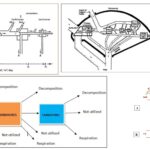IGCSE Biology 35 Views 1 Answers
Sourav PanLv 9November 15, 2024
Describe gene mutation as a random change in the base sequence of DNA
Describe gene mutation as a random change in the base sequence of DNA
Please login to save the post
Please login to submit an answer.
Sourav PanLv 9May 15, 2025
Gene mutation refers to a permanent alteration in the nucleotide sequence of a gene, resulting in a change in the genetic information carried by that gene. These mutations can occur spontaneously or be induced by external factors, and they play a crucial role in genetic diversity and evolution.
Characteristics of Gene Mutations
- Random Nature
- Gene mutations occur randomly, meaning that they can happen at any point in the DNA sequence without any specific pattern or predictability. This randomness is a fundamental aspect of mutation, contributing to the genetic variation observed within populations.
- Types of Changes
- Substitutions: A single nucleotide base is replaced by another. For example, an adenine (A) might be replaced by a guanine (G).
- Insertions: One or more nucleotide bases are added to the DNA sequence, which can shift the reading frame during protein synthesis.
- Deletions: One or more nucleotide bases are removed from the sequence, also potentially causing a frameshift.
- These changes can affect how genes are expressed and can lead to variations in traits.
Causes of Gene Mutations
- Spontaneous Mutations
- These occur naturally during DNA replication when errors are made and not corrected by DNA repair mechanisms. They can arise from chemical reactions within the cell or during normal cellular processes.
- Induced Mutations
- External factors such as radiation (e.g., UV light, X-rays) and chemical mutagens (e.g., certain drugs, pollutants) can cause changes in the DNA sequence. These agents can damage DNA directly or create reactive intermediates that interact with DNA.
Effects of Gene Mutations
- Neutral Mutations: Many mutations have no effect on the organism’s phenotype, especially if they occur in non-coding regions or do not alter protein function.
- Beneficial Mutations: Some mutations may confer advantages, such as increased resistance to diseases or improved metabolic efficiency, which can be favored by natural selection.
- Harmful Mutations: Conversely, mutations can lead to detrimental effects, such as genetic disorders or increased susceptibility to diseases. For instance, mutations in the BRCA1 gene are linked to a higher risk of breast and ovarian cancer.
0
0 likes
- Share on Facebook
- Share on Twitter
- Share on LinkedIn
0 found this helpful out of 0 votes
Helpful: 0%
Helpful: 0%
Was this page helpful?




